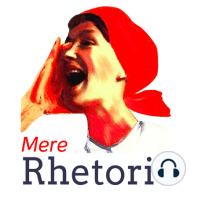12 min listen
Susan Peck MacDonald (NEW AND IMPROVED!)
FromMere Rhetoric
ratings:
Length:
9 minutes
Released:
Jun 15, 2016
Format:
Podcast episode
Description
[acoustic guitar music] Welcome to Mere Rhetoric, a podcast for beginners and insiders about the ideas, terms, and movements who have shaped rhetorical history. I'm Mary Hedengren. If you're listening to this podcast, you're probably somebody who's interested in the power of language. You're probably an English major or a Rhetoric and Writing major, or you're at least taking a class in it. But there are a lot of different disciplines that we've all interacted with. Whether it was a required biology class when you were an undergraduate, or a course in statistics you're taking right now. One of the things that's difficult to tease out in rhetoric and composition is how different disciplines create different types of writing genres and different forms of writing. This is one of the things that Susan Peck MacDonald encountered in the early 1990s. In her book Professional Academic Writing, she thinks about writing in these different disciplines as a spectrum. She sees these academic disciplines may be roughly ranged on a continuum by the degree to which their knowledge-making goals and practices are in the foreground. But even though she puts them around a continuum, she's not saying that there's anything wrong with having different types of knowledge-making goals, nor is it too, as she says, "deny that there may be other goals in the social sciences and humanities, but it serves as a focal point for exploring the differences among the disciplines." So along the spectrum, she posits on one side, academic fields are arrayed more or less on a continuum, from the hard sciences to the soft humanities. And in this way, she realizes that a lot of the work that's been done by people in the humanities has been to what she calls "debunk" -- fields that are harder than the field that they're written in. So something about being in the humanities makes you want to prove that science isn't just objective. And she says that this debunking, quote, "suggests there is a strong tendency toward rearguard action, stemming from perceived loss of power, desire for enhanced status, and intellectual insecurity among social scientists and humanists." While that may be true, sometimes I do think we suffer from what she terms "science envy". So I think it's fair to sort of re-approach this question of disciplinarity from what it would be like within that actual discipline. So that's just what she's done. She's compiled these three sort of representative groups: the humanities, the social sciences, and science. And she's put them along this continuum. So representing science, she has psychology, specifically infant attachment research. So this is, you know, how much babies are attached to their mothers and what impact that has and how to test that. The sort of stuff where you actually have people in white lab coats standing behind two-way mirrors, observing stuff happening. Then in the middle, she has social sciences, which in this group is history, which sometimes looks a little bit more like humanities and sometimes looks a little bit more social studies-ish. Then on the far end, she has humanities. And the group that she looks up is new historicists, which in the mid-90s were kind of a big rising star in the world of literary studies. So she puts these groups along the continuum, and then she tries to find, what are some of the representative articles of it? So she gets some journals that are representative in the field of these three different studies. And what she does is she begins to look at the writing styles, even down to the very level of sentences. She says that academic writing may be readily described as a vehicle for constructing and negotiating knowledge claims. So she suggests that the different types of knowledge claims that these three groups are making is going to be represented in the type of sentences that they use. And so to be able to do this, she codes these sentences in seven different groups. The first group are the groups that she
Released:
Jun 15, 2016
Format:
Podcast episode
Titles in the series (99)
Ekphrasis (NEW AND IMPROVED: Ekphrasis Welcome to Mere Rhetoric, a podcast for beginners and insiders about the ideas, people and movements who have shaped rhetorical history. I’m Mary Hedengren and, ah, here I am in my newly redecorated research cube. I’ve taped... by Mere Rhetoric
